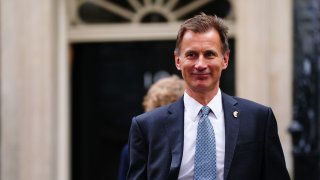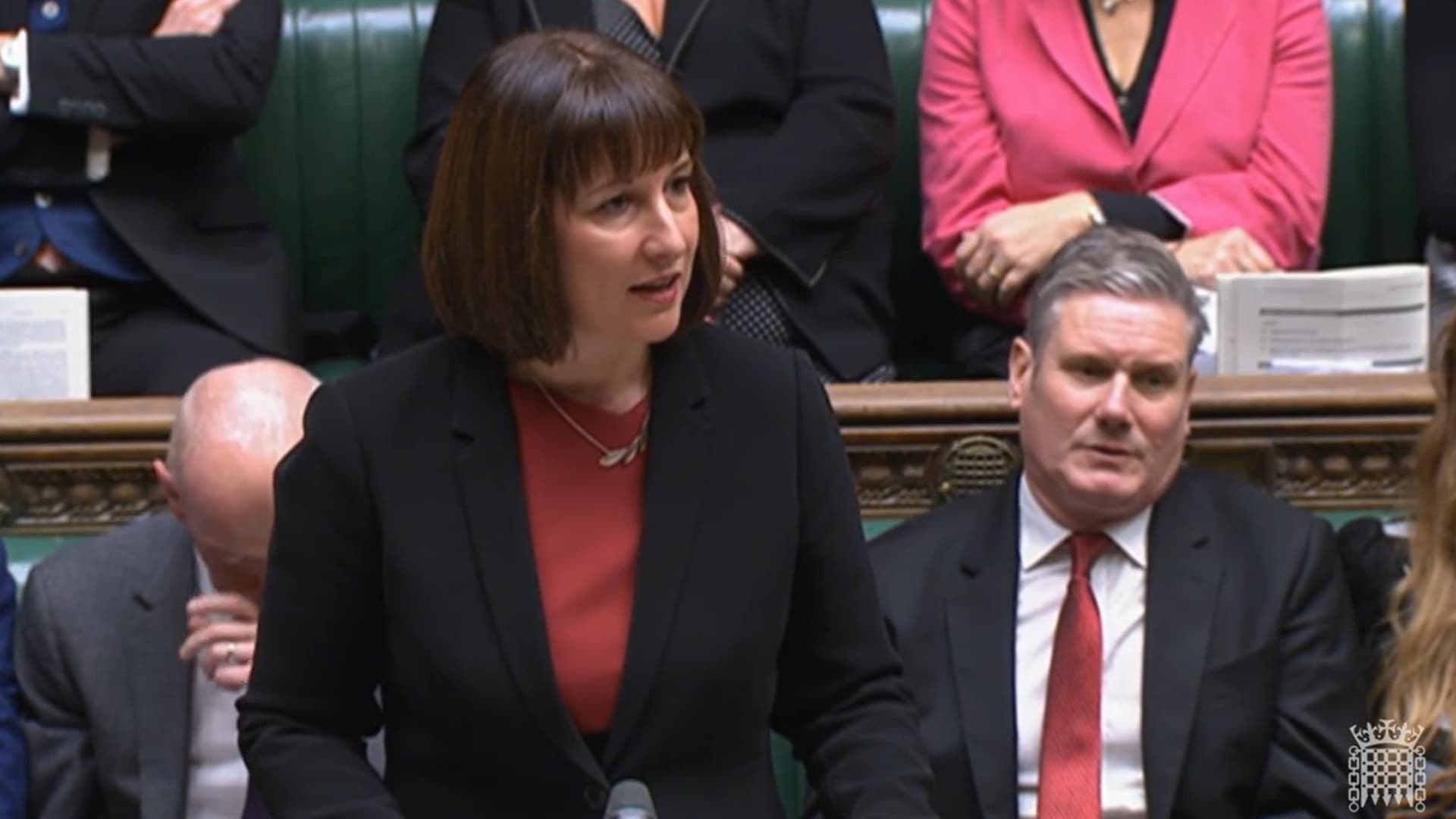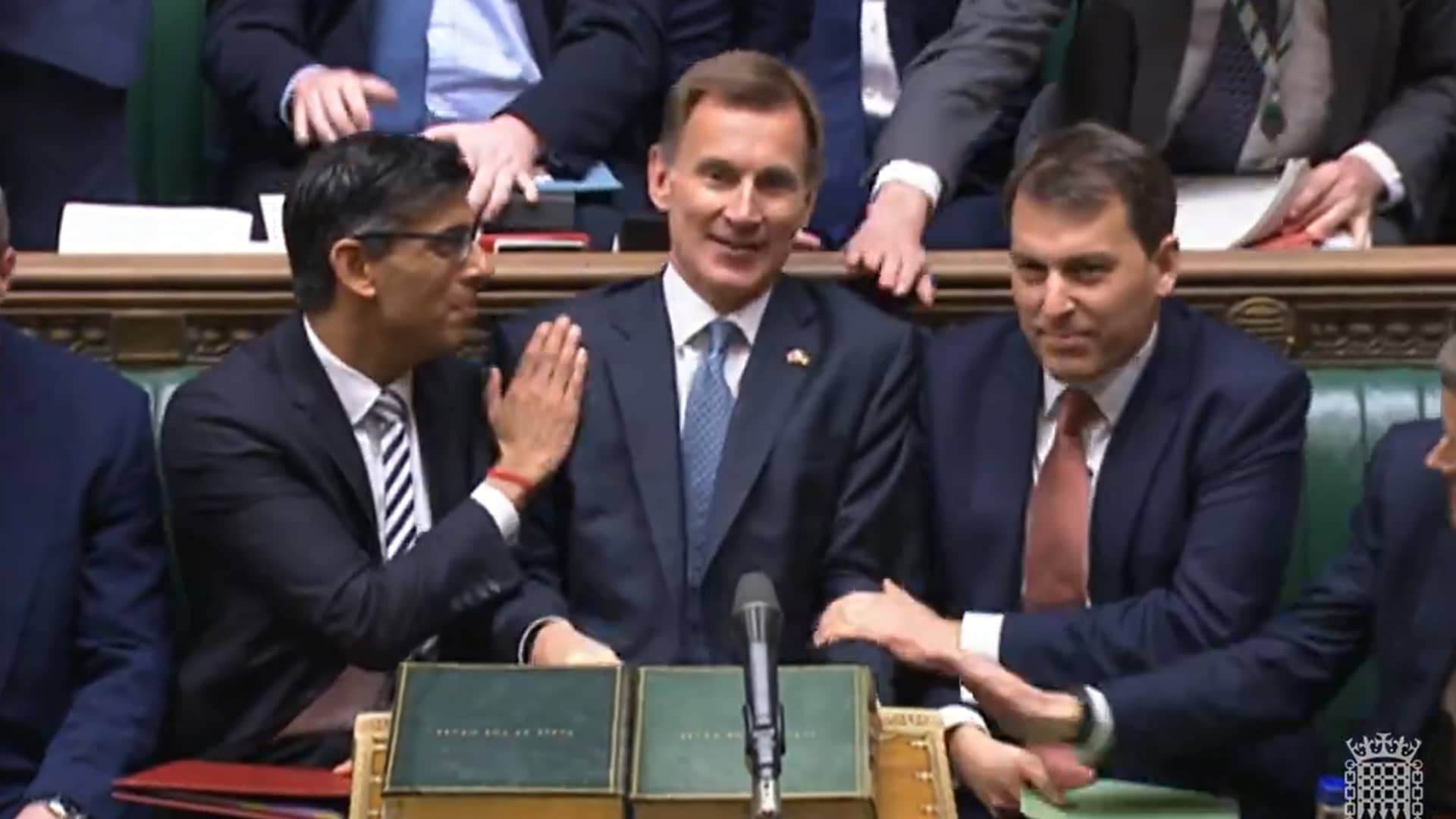
This is CNBC's live coverage of U.K. Finance Minister Jeremy Hunt's Autumn fiscal statement.
U.K. Finance Minister Jeremy Hunt delivered his Autumn Statement on Thursday, announcing a slew of tax rises and spending cuts as he attempts to plug a substantial hole in the country's public finances.
He unveiled a sweeping £55 billion ($66 billion) fiscal plan as he sought to restore the country's credibility under new Prime Minister Rishi Sunak's government, after the chaos unleashed by former leader Liz Truss' disastrous "mini-budget" in late September.
Hunt's announcements on Thursday will mean millions more people paying higher rates of income tax and higher energy bills. He also confirmed a substantial increase to windfall taxes on the profits of oil and gas companies and additional investment in schools and the National Health Service.
Get Tri-state area news and weather forecasts to your inbox. Sign up for NBC New York newsletters.
The independent Office for Budget Responsibility (OBR) now estimates that the U.K. economy is in recession and that GDP will contract by 1.4% in 2023, while inflation is predicted to hit 9.1% this year and 7.4% next year.
British pound falls 1% against the dollar
Money Report
The British pound fell 1% against the U.S. dollar during afternoon trade shortly after U.K. Finance Minister Jeremy Hunt unveiled the government's fiscal plan.
Sterling was last seen trading at $1.1784.
— Karen Gilchrist
Conservative MP Jacob Rees-Mogg blasts tax hikes
Conservative member of parliament Jacob Rees-Mogg, an ally of former prime ministers Boris Johnson and Liz Truss, criticized the government's tax increases.
"I'm particularly concerned about the tax rises when an economy is going into recession," he said. "You would normally expect there to be some fiscal support from an economy in recession."
OBR: UK to suffer largest fall in living standards since records began
The U.K. will suffer the largest fall in living standards since records began, according to Thursday's report from the independent Office for Budget Responsibility (OBR).
Real household disposable income, a measure of living standards, is projected to fall by 4.3% in 2022-23, the largest single-year decline since the Office for National Statistics began recording in 1956-57.
This will be followed by the second-largest fall of 2.8% the following year, and the cumulative decline of 7.1% from 2021-22 to 2023-24 takes RHDI to its lowest point since 2014.
By 2027-28, RHDI is set to recover to its 2021-22 level, but will remain more than 1% below its pre-pandemic level, the OBR said.
Abrdn: Announcements expected, but not 'any less economically painful'
Luke Bartholomew, senior economist at Abrdn, said the government's announcements were largely expected, which explains the muted market response, but this did not make them "any less economically painful."
"The economy is heading for a deep recession, with tighter fiscal policy adding yet another headwind to growth. However, with the U.K. suffering from pronounced underlying inflation pressure, it is far from clear that there is much space for significantly easier fiscal policy to support growth," Bartholomew said.
"The government's strategy appears to assume that by tightening fiscal policy, this means that monetary policy will not have to tighten as much, with the consequence that interest rates will stay lower than they otherwise would have. This means interest rate sensitive parts of the economy, the housing sector in particular, is more protected than it would have been."
Labour: Public got 'an invoice for the economic carnage that this government has created'

In her rebuttal, Shadow Finance Minister Rachel Reeves said "all the country got today was an invoice for the economic carnage that this government has created."
She accused Prime Minister Rishi Sunak's government of trying to artificially distance itself from the damage done by predecessor Liz Truss' September "mini-budget," adding that the U.K. was "uniquely exposed" to external shocks because of choices made by the Conservative government and years of "stagnation."
Reeves highlighted that the U.K. is the only G-7 (Group of Seven) country that has yet to recover its GDP to pre-pandemic levels, while the IMF projects that the U.K. will have the slowest growth of the world's 38 most industrialized economies over the next two years.
She argued that no other advanced economy is implementing tax hikes and spending cuts as recession closes in, and accused the government of presiding over "the biggest wage squeeze in centuries."
"This was a crisis made in Downing Street and it is ordinary working people who are paying the price," she said, adding that Hunt had "picked the pockets" of working people through "a raft of stealth taxes" that will take £600 from the average person.
Hunt lauds plan for 'stability, growth and public services'

Hunt rounded out his speech by asserting that the government had presented "a balanced plan for stability, a plan for growth and a plan for public services."
"It shows that you don't need to choose either a strong economy or good public services," he concluded.
Pensions and benefits to rise in line with inflation
Pensions and means-tested benefits, including Universal Credit, will rise in line with September's annual inflation level of 10.1% from next April, Hunt confirms.
"That is an expensive commitment costing £11 billion, but it means 10 million working age families will see a much-needed increase next year."
National Living Wage increases
The U.K.'s National Living Wage will rise from £9.50 per hour for over-23s to £10.42 from April next year, representing an annual pay rise worth more than £1,600 for a full-time employee, Hunt says.
Hunt announces additional cost-of-living support
Hunt announces that cost of living support payments will be paid to those on low incomes, pensioners and people on disability benefits.
Further payments of £900 will be paid to those on means-tested benefits, while pensioner households will receive £300 and people on disability benefits £150.
Millions to see energy bills increase from April
Hunt confirms that the government's energy price cap for a typical household will rise from April to £3,000 annually from its current level of £2,500, and will run for a further 12 months.
Hunt vows to push ahead with Northern Powerhouse rail and HS2
Hunt confirms that flagship rail projects the Northern Powerhouse, HS2 and the East West Rail will go ahead as planned, and vows more than £600 billion of investment in national infrastructure over the next five years, including a new hospitals program and gigabit broadband rollout.
Hunt outlines 'energy, infrastructure and innovation' as growth priorities
Hunt says unless the country acts "radically" to cut energy consumption, "we will both bankrupt our economy and harm our planet."
He announces that contracts will be signed imminently to begin work on the Sizewell C nuclear plant in the southeast of England, which is expected to supply up to 7% of the country's total electricity needs. However, it is not expected to start generating until the 2030s.
"This will create 10,000 highly skilled jobs and provide reliable, low carbon power to the equivalent of six million homes for 50 years," he says, adding that the project will cost £700 million.
Hunt sets new national target for a reduction of energy consumption from buildings and industry by 15% by 2030, yielding a £28 billion saving from the national energy bill in today's prices.
The government will invest a further £6 billion from 2025 to remove the "single biggest driver of inflation and volatility facing British businesses and consumers."
NHS budget to be increased by £3.3 billion in each of next two years
Hunt vows to address the impact on the National Health Service of workforce shortages and pressures in the social care sector.
He says the NHS budget will rise in each of the next two years by £3.3 billion, but asks the health service to join all public services in tackling inefficiency.
"We want Scandinavian quality alongside Singaporean efficiency, both better outcomes for citizens and better value for taxpayers," Hunt says.
"That doesn't mean asking people on the frontline to work harder, but rather asking challenging questions on how to reform all public services for the better," he adds.
- Elliot Smith
Extra £2.3 billion to be invested in schools
Hunt promises a further £2.3 billion investment in schools in 2023 and 2024 and says he has appointed an advisor to work on a "skills reforms program" to ensure school leavers have skills to enter the workplace.
Hunt: 'We remain fully committed' to COP26 climate pact
Hunt promises that the government will retain climate commitments.
"With the existential vulnerability we face, now would be the wrong time to step back from our international climate responsibilities, so I also confirm that despite the economic pressures, we remain fully committed to the historic Glasgow climate pact agreed at COP 26, including a 68% reduction in our own emissions by 2030," he says.
Hunt announces 'difficult decisions on public finances'
Hunt announces that public spending will grow below the rate of GDP growth and says government departments "will have to make efficiencies to deal with inflationary pressures in the next two years."
The Department for Work and Pensions will undertake a "thorough review" of the U.K.'s declining workforce participation rate.
The government will ask over 600,000 more people receiving Universal Credit to meet with a "work coach" in order to increase hours and earnings. Another £280 million will be invested to "crack down on benefit fraud and errors" over the next two years.
Hunt says it is impossible to sustain the country's 0.7% target for overseas aid spending until the "fiscal situation allows."
Plans assume that foreign aid spending will remain around 0.5% for the forecast period.
Energy firms to face expanded windfall taxes
Hunt confirmed that from Jan. 1 until March 2028, the energy profits levy will increase from 25% to 35%, while a new temporary 45% tax will be levied on electricity generators, raising £14 billion for the Treasury next year.
Hunt announces reduction to top rate income tax threshold
The chancellor announced that the threshold at which the highest earners will begin paying the 45p top rate of income tax will be reduced from £150,000 per annum to £125,140.
"Those earning £150,000 or more will pay just over £1,200 more in tax every year," Hunt says.
The measures mean millions of people in Britain will be paying more in tax.
The income tax personal allowance higher rate threshold, main national insurance thresholds and inheritance tax thresholds will be frozen for a further two years to April 2028.
Dividend allowance will be cut from £2,000 to £1,000 next year and then to £500 from April 2024. The annual exemption amount for capital gains tax will be cut from £12,300 to £6,000 next year and £3,000 from April 2024.
Freezing these thresholds means that tax bands will remain unchanged even as wages rise, meaning the proportion of earnings that people pay tax on will rise and more people will fall into higher tax brackets.
OBR forecasts UK inflation rate of 9.1% in 2022 and confirms recession
Hunt says the independent Office for Budget Responsibility projects that U.K. inflation will average 9.1% this year and 7.4% this year, and that the economy is now in recession.
Gross domestic product is forecast to grow by 4.2% in 2022, before falling 1.4% in 2023, then rising by 1.3%, 2.6% and 2.7% in the following three years.
Unemployment is expected to rise from 3.6% today to 4.9% in 2024, before falling to 4.1%.
Hunt says government plan will prioritize 'stability, growth and public services'
Finance Minister Jeremy Hunt vows that the government plan will prioritize "stability, growth and public services."
UK fiscal plan has large margin for error on OBR forecasts, says Liberal Democrat MP
Sarah Olney, Liberal Democrat MP for Richmond Park, says the U.K.'s fiscal statement, unlike the chaotic mini-budget, will be based on the Office for Budget Responsibility's economic forecasts. But those estimates remain highly uncertain and leave significant margin for error.
Sterling is still volatile, it's very much a dollar trade, Barclays managing director says
Sterling is likely to stay volatile, according to Barclays managing director and head of G10 spot FX Ian Tew, who spoke to CNBC's "Squawk Box Europe" ahead of the Autumn Budget statement from U.K. Finance Minister Jeremy Hunt.
Poorly targeted spending cuts could drag on credit metrics, ratings agency says
Ken Egan, director of European sovereign credit at Kroll Bond Rating Agency, told CNBC last week that given the sensitivity of the bond market, Hunt's fiscal announcements will require a "deft and cautious approach."
"This fiscal tightening through spending or higher taxes will likely hamper growth. It's reminiscent of what Thatcher said — 'yes, the medicine is harsh, but the patient requires it' — and what I'd be concerned about is the type of spending cuts," Egan told CNBC via videolink.
"If you target cuts around areas that typically promote stable or longer term growth and productivity such as infrastructure, education, investment spending, this in time potentially drags on various credit metrics."
While acknowledging that exact forecasts were difficult at present given the rate of policy change in the U.K., Egan suggested that government borrowing will ultimately increase regardless, at a time when "redemptions are rising sharply and the rollover costs are quite expensive."
- Elliot Smith
Hunt and Sunak 'risk playing it too safe,' analyst says
As the Bank of England has ramped up interest rates to fight inflation, which came in at a 41-year high of 11.1% in October, the costs of the U.K.'s debt repayments have soared, with £22 billion ($26.2 billion) more paid in interest this year than last.
"That's why help for the poorest households is expected to be the centrepiece for this budget, through a rise in benefits and pensions in line with double digit inflation, which will mount to a big bill for the Treasury," said Susannah Streeter, senior investment and markets analyst at Hargreaves Lansdown.
"To try and re-coup that, stealth taxes on higher income earners are rumoured to be brought in through a freezing of tax thresholds."
The government's scheme to help the country's poorest households with energy bill increases is expected to be continued at a lower and more targeted rate from April, and could be financed through a windfall tax on electricity generating firms, along with North Sea oil and gas producers.
"By taking all these steps the government hopes to fill in the fiscal 'black hole' which has emerged because successive Conservative ministers have said they want to see net debt falling by 2025-2026," Streeter said.
"Sunak and Hunt are trying to dance to a tune they think the bond markets are playing, but by keeping so strictly to their perceived rules, they risk playing it too safe, and pushing the prospects of economic recovery far into the distance."
- Elliot Smith
GAM: An 'unwelcome return to the austerity economics of 2010'
The U.K.'s Autumn Statement will mark an "unwelcome return to the austerity economics of 2010," according to Julian Howard, lead investment director of multi asset solutions at GAM Investments.
"The first guiding principle of new Chancellor Jeremy Hunt appears to be that the books absolutely must be balanced and the £40 billion fiscal gap eliminated, regardless of any long-term assessment of the future cost of borrowing or growth rates," Howard said in an email Wednesday.
"This will mean a combination of vicious spending cuts, to already heavily degraded public services, and tax rises imposed on consumers and businesses, staring down the barrel of a higher inflation and rates-induced recession."
Howard suggested that pro-growth policies are likely to be thin on the ground as Hunt completes the near wholesale rejection of former Prime Minister Liz Truss' economic agenda. Yet he said there is a "very persuasive argument" for growth being key to the U.K.'s ability to service its long-term debts.
"Ex-Monetary Policy Committee member Michael Saunders' recent assessment of the damage done to said growth prospects by Brexit only highlights the wasted opportunity that this Budget represents," Howard said.
"In terms of market outcomes, gilt yields may well fall further as any residual risk premium on holding U.K. debt dissipates. This should not be taken as vindication of a return to fiscal rectitude since gilt yields also incorporate a prediction about the future trajectory of growth."
He added that the bond market's judgment is likely to remain "deeply unfavorable," while the country's growth prospects and currency are set to dwindle over the medium term.
"Based on what we expect to hear from the Chancellor, nothing in the upcoming Autumn Statement will remotely qualify as being able to divert the country from this gloomy path," Howard said.
- Elliot Smith
Barclays: Government's commitment to fiscal sustainability in doubt if measures 'backloaded'
Barclays expects an austere budget from Finance Minister Jeremy Hunt, but suggested the government could face questions over its commitment to fiscal sustainability if a substantial portion of the new measures are "backloaded."
"To maintain credibility with investors, in our view, the government will focus on the size of fiscal tightening. However, the composition and timing of fiscal tightening will matter too," said Barclays Chief European Economist Silvia Ardagna.
"Near term, we expect the largest fraction of fiscal adjustment to be achieved via tax increases. We think spending cuts will be mainly budgeted for after the 2024 general election. As such, the delivery of these spending cuts remains uncertain."
- Elliot Smith
Barclays Private Bank sees £30 billion tax rises and public spending cuts
Barclays Private Bank said Wednesday that it is taking a "pessimistic view" of the U.K.'s growth prospects, citing "wilting economic data, political turmoil and policy confusion."
"The government's mini-budget in September sent a shockwave through U.K. assets, as investors questioned the sustainability of the nation's finances," said Henk Potts, EMEA market strategist at Barclays Private Bank.
"Additional pressure on the U.K.'s fiscal position has been created by the deteriorating growth profile, rapid rise in interest rates, and higher cost of servicing inflation-linked debt."
In order for the government to restore fiscal sustainability and return the deficit to between 1% and 2% of GDP, Potts estimated that additional tax increases or public spending cuts totaling around £30 billion ($35.6 billion) will be required.
"Given the multitude of pressures on the UK economy, we think that a deeper and more prolonged recession is inevitable," Potts added.
"We expect that the economy will register five consecutive quarters of negative growth, starting in the third quarter of 2022."
- Elliot Smith
'Everything that can be taxed will be taxed,' fund manager says
Asked about the prospect of further windfall taxes on energy companies amid soaring commodity prices, Daniel Avigad, partner and portfolio manager at Lansdowne Partners, told CNBC on Wednesday that "everything that can be taxed, will be taxed."
"That applies not just to oil and gas, but to all aspects of the economy, given that governments have major deficits to fund in terms of primary resources and self-sufficiency, and as a consequence will try to raise capital from whatever sources they can find," Avigad said.
- Elliot Smith
UK inflation hits 41-year high of 11.1% as food and energy prices continue to soar
U.K. inflation jumped to a 41-year high of 11.1% in October, exceeding expectations as food, transport and energy prices continued to squeeze households and businesses.
"Indicative modelled consumer price inflation estimates suggest that the CPI rate would have last been higher in October 1981, where the estimate for the annual inflation rate was 11.2%," the Office for National Statistics said.
On a monthly basis, the CPI rose 2% in October, matching the annual CPI inflation rate between July 2020 and 2021.
- Elliot Smith






